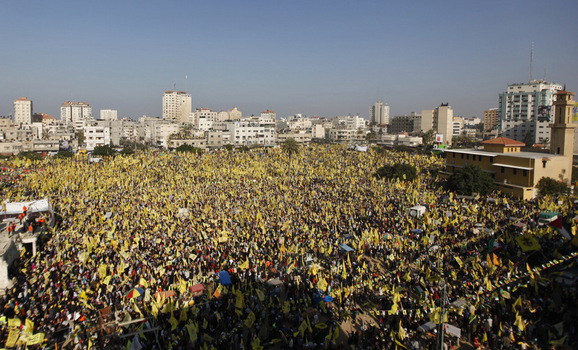PA Employees in Gaza Key to Reconciliation

By: Omar Shaban.
![]() In response to the Hamas takeover of the Gaza Strip in June 2007, the Palestinian Authority (PA) took several measures, all of which — according to their claims — aimed to render the Hamas government’s task of running the Gaza Strip impossible, and to push it to quickly be exposed and collapse.
In response to the Hamas takeover of the Gaza Strip in June 2007, the Palestinian Authority (PA) took several measures, all of which — according to their claims — aimed to render the Hamas government’s task of running the Gaza Strip impossible, and to push it to quickly be exposed and collapse.
Among these measures, the PA in Ramallah asked its employees in the Gaza Strip to stop working with the “sacked” Hamas government. The reason for this decision was attributed to confusion on the part of the Hamas government, which suddenly found itself responsible for 1.5 million Palestinians in the absence of a competent and qualified government. As a result, and in an attempt to assert its ability to address the challenge, the Hamas government was forced to fill thousands of vacancies with its supporters, most of whom lacked the necessary qualifications, experience and training.
On the other hand, employees found themselves between the hammer of the PA’s decision to strike and cut salaries in the event of noncompliance, and the anvil of a desire to work and feel productive.
The PA’s request from its employees not to work with the Hamas government spurred diverging debates about the legitimacy of such a decision and its negative effects on Palestinian society. Also, their resumption of work posed a challenge. It was easy to take such a decision without careful consideration of its ramifications.
The legality of the decision
The PA’s justification for its decision to prohibit its employees in Gaza from working with the Hamas government is that the latter has become illegal and was dismissed through a presidential decree. Thus, it cannot allow its employees to work with the sacked Hamas government — as if the dismissal of the government includes the dismissal of the bureaucratic apparatus.
Many legal experts questioned the legality of the PA’s decision to prohibit its employees from working under the Hamas government. Some considered it illegal, since it deals with state employees as members of a political party rather than part of the general effort. These say that government employees are important assets of the political system and society, regardless of the ruling party, and therefore should not be involved in political differences. They add that the money and aid invested in the formation and rehabilitation of the Palestinian bureaucratic system — which is a main element of sovereignty — aims to serve the public interest, not a particular political organization.
Others described the decision as short-sighted, as it undermined the PA’s presence in the government apparatus in Gaza and weakened its influence, especially in the health and education sectors, while giving its rival, Hamas, a golden opportunity to control the bureaucratic system and use it to market its policy and boost its popularity.
The PA government punished everyone who violated the decision by cutting off their salaries. This contradicts basic Palestinian law, which prohibits cutting the salaries of government employees without reasons included in the law. This step further deepened social tension and political polarization in society.
Dire social problems
The strike by thousands of employees caused tremendous upheaval in Palestinian society. These employees represent an enormous workforce, which were highly invested in through education and training. Also, this group possesses considerable experience, of which Palestinian society was in dire need to continue development and face mounting needs resulting from occasional Israeli blockades and escalating tensions. This decision created a huge vacuum in the government apparatus, especially in the health and education sectors where over 30,000 employees work, and weakened the performance of these two key sectors.
The unemployed and poor who lack a steady source of income looked on with envy and hatred at the strikers, who receive high fixed salaries — some reaching $2,000 per month — without putting in any effort, while they work in inferior and exhausting jobs in return for very low wages of no more than $500 per month.
Palestinian society was in urgent need of the services of this kind of employee, who possess key expertise that are indispensable in general, and during times of war and siege in particular.
It has been said that the fact that the PA continues to pay the salaries of striking employees created the financial crisis. The salaries of strikers are being paid by donor countries, which implies the latter’s approval of the strike, consistent with their opposition to the Hamas government. Equally important, the decision distorted natural relations and the distribution of roles between men and women in society.
The solution is easier than thought
If not addressed, this issue will be a real dilemma for national reconciliation. However, if addressed, it will be an asset as it will ease social tension and enable any future government to move forward with the reconstruction of the Gaza Strip.
The reincorporation of employees in the government apparatus may seem difficult, but solving the problem would provide an encouraging atmosphere for its implementation. Steady population growth in the Gaza Strip and rebuilding what has been destroyed by the siege and war provide a tremendous opportunity for re-accommodating them. There is an urgent need for their specialties. Many employees found the idleness to be unbearable and gradually resumed work with the Hamas government. Others left the Gaza Strip to live abroad; a part of them having reached the legal retirement age while others passed away. Reincorporating them into the government requires rehabilitation and development programs to fill the educational and training gap resulting from six years of unemployment.
Still, it is an unavoidable step to promote reconciliation and enable the Palestinian political system to regain its unity and role in achieving development.
It is worth noting that during the Israeli aggression in the Gaza Strip in November 2012, the PA allowed its employees on strike to resume their jobs, especially those working in the civil defense and health services to help with fires and injuries. However, the resumption of work by thousands still needs political and administrative decision. It would be the first chapter of national reconciliation, as it would allow easy integration, ensure continuation, and permit the activation of the development process.
Source:
[highlight]http://www.al-monitor.com/pulse/originals/2013/02/palestine-reconciliation-today.html[/highlight]




